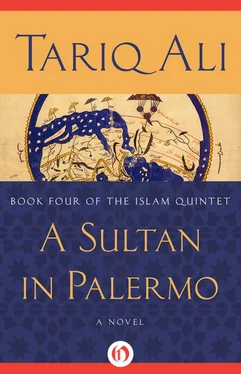As the sailors approached the minarets they chanted ‘al-madina hama-hallahu’ [Allah protect this City]. He smiled as the ship entered the harbour, an expressionless smile, a slight softening of the eyes, nothing more. He was pleased to be back. The gentle breeze stroked his face like the soft touch of Mayya and inadvertently his hand went to his face to savour the memory. Below a boat was waiting to transport him to dry land. Walking past the men, he thanked each of them in turn. He suppressed a sigh as he was gently tied with silken cords to a chair, which was then lowered on to the boat. He would have happily climbed down the rope ladder, but the captain forbade it. As the chair reached its destination the boatmen welcomed him with ‘Wa Salaam…’
Nearing the shore, he could see the familiar faces of the courtiers sent to receive him. He knew that underneath their smiles and the exaggerated noises of welcome, they hated him because of the easy access to the palace he enjoyed. And there was the white beard of one of the palace Chamberlains, Abd al-Karim, shouting as loudly as his years permitted.
‘Prepare to receive the Master Ibn Muhammad ibn Sharif al-Idrisi returned home from a long journey in search of the roots of knowledge.’
As was the custom, the others responded to the safe return of the ship and its passenger.
‘There is only one Allah and he is Allah and Muhammad is his Prophet. Welcome home.’
The irritation he felt on these occasions had, in the past, been countered by the presence of his friend Marwan, whose grinning face was the welcome he most enjoyed. But Marwan had left the island. He had abandoned his estates and his peasants in Catania and fled to al-Andalus, to the city of Ishbilia. Here the Sultan al-Mutammid had provided him with both protection and employment. Letters arrived irregularly, always carrying the same message. Muhammad, too, should leave Palermo and return to the House of Islam. He never replied and Marwan stopped writing.
Now he was alone.
‘Will the master be carried or will he ride?’ Abd al-Karim asked.
‘Is my horse here?’
‘It is.’
‘Then I will ride.’
‘The Sultan awaits you tonight. A banquet has been prepared to honour your return.’
‘And if a storm had delayed us?’
Another voice replied. ‘It never has. You always return on the designated day, Ibn Muhammad.’
The scholar smiled. The voice and the face pleased him. It was the Berber, Jauhar, who had married Marwan’s sister.
‘Any news from Marwan?’
The man shook his head.
‘And you? Is your family well? Do you need anything? I have brought some silks for Marwan’s sister. We exchanged them for some food. A merchant ship from Genoa was in some trouble.’
The man smiled.
‘And now I have a favour to ask of you. Go to the palace and apologise to the Sultan on my behalf. Tell him the journey has exhausted me and I would only fall asleep at the banquet. Tomorrow I will attend on him and provide him with the new discoveries he requested. I wish to be alone tonight. I have something to tell the stars.’
Jauhar looked worried and whispered: ‘It is an unwise decision. The Sultan is ill. It has made him irrational. He might misinterpret your refusal to go to the palace tonight. Monks surround him. Franks and Greeks. Vultures. They whisper lies in the Sultan’s ear. We are being accused of fomenting rebellion.’
Idrisi shook his head. He would not change his mind. ‘His Exalted Majesty knows I am the most loyal of his servants, but I have travelled for many days without a bath and will not present myself in such a state of unseemliness. I will call on the Sultan after the morning prayers. Make that clear to the Chamberlain.’
The courtiers had overheard most of this exchange and smiled. He had gone too far this time. He would be punished. They were determined to reach the Sultan before Jauhar to give Rujari their version of the story.
Idrisi, accompanied by a single groom, rode back to his house, which was situated outside the qasr, close to the sea. He could have lived in the precincts of the palace. The Sultan had offered him that on many occasions, but Idrisi had insisted that he needed solitude in order to think. He worked on his manuscript in rooms adjoining the palace library and often ate with the Sultan, but he had chosen to live in a modest house in the Kalisa, overlooking the sea.
It was a choice he had never regretted. The permanent view of the sea he found comforting. Becalmed or white-capped and rough, it never tired him, despite the long journeys on which he had embarked or the storms that had almost taken his life. It was a short ride but one he enjoyed. Gusts of that same wind that had brought the ship into the bay now carried scents of herbs and wild flowers and lemons. The scents brought some painful memories with them, but he repressed them.
As he neared the path at the bottom of the hill he caught the first glimpse of the house. The soft light of candles and oil lamps filled every window. Then he looked more closely. Light was shining even from the windows of the rooms above the courtyard, rooms that had been dark since the day of Walid’s departure. His heart began to race and, almost involuntarily, he spurred his horse on.
Family life and domestic idiocies. Idrisi foils a plan by his daughters to trap and betray their husbands, but is determined to educate his grandsons.
THE RETAINERS, AS WAS their custom, awaited him outside the house, torches held high to light his path. He dismounted and shook hands with each in turn, but before he could question any of them he was distracted by the scent of grilled lamb and fresh herbs, an aroma of special significance. He hurried into the house to see if Walid had returned. But it was his daughters who greeted him, taking his hands and kissing them. Idrisi embraced each in turn and gently kissed their heads.
‘Welcome home, Abu Walid,’ said Samar, the younger of the two, her red hair shining under the oil lamps.
‘What brings you here, Samar? And you, Sakina? I thought your mother had forbidden…’
‘You haven’t seen your grandchildren for three years, Abu Walid. Our mother agreed we could make this journey.’
He chuckled. ‘Old age must have softened her. Are the children asleep?’
His daughters nodded.
‘And am I correct in assuming that you have prepared the lamb according to your mother’s instructions?’
Samar laughed. ‘We weren’t sure you would return today, but a messenger from the palace arrived some hours ago to inform us that your ship had been sighted and you would be home tonight. The garlic and herbs travelled with us from Noto.’
He smiled appreciatively. ‘I hope, like you, they retained their freshness.’
Before either of them could reply he clapped his hands, raised his voice slightly and summoned the steward of the household. ‘Is my bath ready, Ibn Fityan?’
The eunuch bowed. ‘Thawdor is waiting to rub oil on Your Excellency’ and the bath attendants have their instructions. Will Your Honour eat inside or on the terrace?’
‘Let my daughters decide.’
Usually, when he lay on the slab of marble, he let the Greek do his work in silence. Not today. ‘Do you have any children, Thawdor?’
The masseur was shocked. In the six years he had served in the household, the master had barely spoken to him.
‘Yes, my lord. I have three boys and a girl.’
‘I suppose two of the boys have been pledged to the Church?’
‘I believe in Allah and his Prophet, but my wife is a Nazarene and insisted on having one of them baptised.’
Now it was Idrisi’s turn to be surprised. ‘But your name is Greek and I thought…’
Читать дальше












